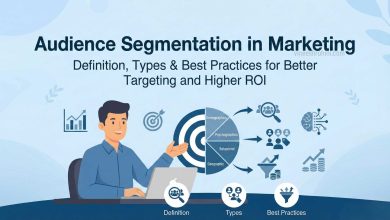Ethical Digital Marketing: Avoiding Dark Patterns and Misinformation : Comprehensive Guide 2025
Ethical Digital Marketing : In the fast-paced and highly competitive world of digital marketing, businesses are constantly seeking new ways to attract, engage, and convert customers. However, as the industry evolves, so too does the scrutiny around the tactics marketers use to achieve these goals. Ethical digital marketing has emerged as a cornerstone of long-term success and brand trust in 2025.
Table of Contents
With the growing awareness among consumers about their rights and the rise in regulatory measures worldwide, it has become more important than ever for digital marketers to uphold transparency, honesty, and integrity in their campaigns. This comprehensive guide explores the concept of ethical digital marketing, the dangers of dark patterns, the consequences of misinformation, and actionable strategies to create value-driven, trustworthy marketing experiences in 2025.
What is Ethical Digital Marketing?

Ethical digital marketing refers to the practice of promoting products or services online in a way that is honest, respectful, and transparent. It prioritizes the well-being and informed decision-making of consumers over short-term gains.
Also Read : How to Use Reddit & Quora for Digital Marketing
Unlike manipulative tactics designed to exploit psychological triggers or deceive users, ethical marketing fosters trust, builds lasting relationships, and enhances a brand’s reputation. Ethical marketing practices also align with legal compliance, industry regulations, and social responsibility.
Key Principles of Ethical Digital Marketing
- Transparency: Be clear about your offerings, pricing, and policies. Avoid hidden fees, fine print, or misleading claims.
- Consent and Privacy: Obtain user consent before collecting or using personal data. Adhere to data protection laws like GDPR and CCPA.
- Truthfulness: Ensure that all advertising and content are factually accurate and not exaggerated.
- Inclusivity and Respect: Avoid discriminatory or offensive language. Promote diversity and be mindful of cultural sensitivity.
- Accountability: Own up to mistakes and respond to customer feedback with sincerity.
Understanding Dark Patterns in Digital Marketing
Dark patterns are design elements and tactics intentionally created to manipulate users into taking actions they might not otherwise take. These deceptive practices can severely damage brand trust and often lead to legal repercussions. Common examples include:
- Bait and Switch: Advertising one thing but delivering another.
- Forced Continuity: Making it difficult to cancel subscriptions or auto-renewals without explicit user consent.
- Hidden Costs: Adding unexpected fees at the last step of checkout.
- Confirmshaming: Guilt-tripping users into opting into something they don’t want.
- Trick Questions: Wording that confuses users into giving consent or opting in unintentionally.
- Sneak into Basket: Adding items to the user’s cart without their knowledge.
These practices erode consumer trust and often violate consumer protection laws.
The Rise of Misinformation in Digital Marketing
Misinformation in digital marketing involves spreading false or misleading information to drive traffic, boost conversions, or damage competitors. It can range from fake product reviews and testimonials to misrepresented statistics and health claims. In 2025, misinformation remains a growing concern, especially in industries like health, finance, and politics. Consequences include regulatory fines, public backlash, and long-term damage to brand reputation.
Why Ethical Marketing Matters in 2025

- Regulatory Pressure: Governments are cracking down on unethical practices. The EU’s Digital Services Act and the U.S. FTC’s updated guidelines are prime examples.
- Consumer Awareness: Digital consumers in 2025 are more informed, tech-savvy, and sensitive to manipulation than ever before.
- Brand Loyalty: Trust-driven brands outperform others. Consumers prefer companies that align with their values.
- Sustainable Growth: Ethical marketing ensures sustainable growth through long-term relationships, not short-lived sales spikes.
Strategies for Ethical Digital Marketing
- Conduct Honest Advertising: Make accurate claims. Avoid using fear tactics or exaggerated promises. Back claims with verifiable data.
- Implement Transparent Pricing: Show full prices upfront. Highlight taxes, shipping, and any additional fees clearly.
- Respect User Privacy: Provide opt-in choices. Explain how data is used and allow easy opt-outs.
- Use Ethical Copywriting: Avoid manipulative language or scarcity tactics that induce pressure.
- Create Genuine Content: Focus on value-driven content that educates, informs, and inspires. Avoid clickbait headlines.
- Leverage Ethical SEO Practices: Don’t engage in keyword stuffing, link schemes, or content cloaking. Focus on relevance and quality.
- Be Inclusive: Ensure your marketing materials are accessible to all audiences, including those with disabilities.
- Use Authentic Influencer Marketing: Partner with real influencers who genuinely use your products. Avoid fake followers or engagement.
- Foster Community Engagement: Encourage dialogue with your audience. Respond to queries and feedback respectfully.
- Train Your Team: Provide regular training on digital ethics and compliance to your marketing team.
Case Studies: Brands Doing It Right
- Patagonia: This outdoor brand emphasizes sustainability and transparency in every campaign. Their “Don’t Buy This Jacket” campaign encouraged conscious consumerism, increasing trust.
- Everlane: Known for their “Radical Transparency” policy, Everlane shares production costs and factory details to promote trust and ethical sourcing.
- Mozilla: Advocates for internet privacy and transparency. Their campaigns often highlight data protection and consumer rights.
Avoiding Unethical Marketing Traps
- Don’t Exploit Urgency: Flash sales or countdown timers should be real, not fabricated to manipulate.
- Avoid Paid Fake Reviews: Genuine customer feedback is essential. Fake testimonials can backfire.
- Stay Clear of Sensationalism: Don’t spread fear, misinformation, or controversial content just to gain attention.
- Be Honest About Affiliations: Clearly disclose sponsored posts or affiliate relationships.
- Ensure Accessibility: Don’t ignore users with visual, auditory, or cognitive impairments. Use alt text, captions, and readable layouts.
Tools to Support Ethical Marketing in 2025
- OneTrust or Cookiebot: For ethical data collection and cookie consent management.
- Grammarly and Hemingway Editor: Ensure honest, readable, and non-manipulative copywriting.
- CanIRank and Clearscope: Help create value-focused SEO content without gaming the system.
- Hotjar or Crazy Egg: Use for UX insights, not for trick-based funnel optimization.
- Mention and Brand24: Monitor brand mentions ethically without invading privacy.
Legal Implications of Unethical Digital Marketing
In 2025, the consequences of unethical marketing have become more severe. Regulatory bodies like the FTC (USA), ASA (UK), and GDPR (EU) levy hefty fines on violators. Companies using dark patterns or engaging in deceptive advertising can face class-action lawsuits and be blacklisted from advertising platforms like Google Ads or Facebook Business.
Future of Ethical Digital Marketing
The future of ethical digital marketing is rooted in personalization without intrusion, automation without manipulation, and performance without deception. As AI and machine learning continue to evolve, ethical oversight will be critical in algorithmic marketing. Marketers must ensure that bias is mitigated and user autonomy is respected. Blockchain technology may also play a role in verifying ad transparency and combating misinformation.
Conclusion

Ethical digital marketing is not a passing trend—it’s a foundational approach for building brands that thrive in a transparent, trust-first economy. As consumers demand honesty and regulators clamp down on deception, marketers must evolve from short-term thinkers to long-term stewards of brand reputation.
Buy Now : Ecommerce Website With 100 Products
Avoiding dark patterns and misinformation isn’t just a legal or ethical mandate—it’s a smart business strategy. In 2025 and beyond, success belongs to the marketers who choose integrity over manipulation, and who deliver value with every interaction.
Disclaimer: This guide is for informational purposes only and does not constitute legal or professional advice. Always consult with a compliance expert before implementing changes in your marketing practices.
Author Disclaimer: The author of this guide is not a legal expert. All insights provided are based on current best practices, industry standards, and evolving regulations as of 2025.



